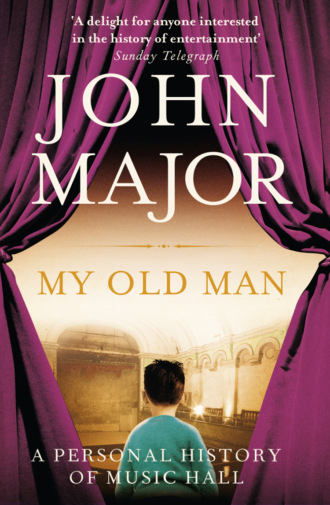
Полная версия
My Old Man: A Personal History of Music Hall
In the swirling smoke of cigars, and amid the clink of glasses and the clatter of cutlery, Paddy Green circulated with a kindly word for the literary, sporting, commercial, political and noble diners who assembled nightly at Joy’s. Posterity has been left a picture of a jovial, grey-haired elderly man moving through the room and beaming at his ‘dear boys’, his invariable greeting to clients, many of whose names he probably could not remember, while taking snuff and exuding an air of familiarity to all.
Green’s jolly nature did not, however, always extend to the most famous of his performers, Sam Cowell. Although tolerated by his admiring audience, Cowell’s habitual lateness exasperated Green. In his performances Cowell brought all his talents to bear: a gift for character, mimicry and visual expressiveness, and a strong, clear voice that enabled him to imbue narrative ballads with drama, comedy or pathos. His songs, often of thwarted love, became enormously popular. ‘Villikins’ and ‘The Ratcatcher’s Daughter’, performed in character with battered hat, seedy frock-coat and huge bow cravat, were demanded by audiences at every appearance. ‘The Ratcatcher’s Daughter’ tells the tale of two working-class sweethearts preparing to marry, although the would-be bride fears she will die before her wedding. And so she does, drowning in the Thames. Her broken-hearted lover then kills himself. We cannot be certain exactly how Sam Cowell presented this song, but its theme of love and tragedy touched the sentimental soul of Victorian London, and it’s easy to see why:
In Vestminster, not long ago,
There liv’d a ratcatcher’s daughter.
That is not quite in Vestminster,
’Cos she liv’d t’other side of the vater.
Her father killed rats and she cried Sprats
All around about that quarter.
The young gentlemen all touched their hats
To the purty little ratcatcher’s daughter.
Such a song could not fail. Though it (just) preceded the birth of the halls themselves, it is one of the first great music hall songs. Cowell sang it in a faux-cockney accent with, Sam Weller style, an inability to pronounce his W’s. It was a model for the rich vein of cockney humour that would follow.
Despite Cowell’s spectacular success, Paddy Green became so frustrated by his erratic timekeeping that he sacked his star performer for persistent lateness. Cowell never appeared at Evans’ again, but found ample employment elsewhere, most famously in the first purpose-built music hall, the Canterbury in Westminster Bridge Road, Lambeth.
Even without Cowell, Evans’ prospered. The principal comedian, Jackie Sharp, a specialist in unscripted, mildly risqué repartee, was at the top of his craft. Sharp’s act featured topical songs that satirised the government. The most well-known, ‘Who’ll Buy My Images?’ and ‘Pity Poor Punch and Judy’, were written by his friend and fellow performer John Labern, one of the foremost comic songwriters of the time. Sharp sang also of the evils of ‘the bottle’ at a time when overindulgence was a national pastime. Sadly, he himself did not heed the lyrics, and like so many others, he frittered away his fortune on alcohol and tobacco. At first drunkenness made him unreliable, and then unemployable. It was not long before a combination of exposure and malnutrition carried him off. He died in Dover Workhouse in 1856, at only thirty-eight years of age.
Cowell and Sharp were star attractions at Joy’s, but they were not alone: on any evening, another fifteen to twenty acts – the small, sweet-voiced tenor John Binge, known as ‘The Singing Mouse’; the big-voiced bass S.A. Jones; the ballad singer Joseph Plumpton – would be there to support them. Most performers were poorly paid, and would try to maximise their income by appearing at more than one venue on the same evening.
Sometime in the 1820s, William Rhodes, yet another former singer from the Covent Garden Theatre, acquired Evans’ principal rivals, the Coal Hole and the Cyder Cellars – the latter of which had hosted entertainment as early as the 1690s. Maiden Lane, where the Cyder Cellars was situated, had a famous pedigree. Voltaire and Henry Fielding had lived there, the great artist J.M.W. Turner was born there (to a wig-maker and his unstable wife), and Nell Gwynne was a resident towards the end of her life. Although the Cyder Cellars often employed the same artists as Evans’, it was far less reputable. It reached the peak of its notoriety around 1840, before Paddy Green took over Evans’, and remained a formidable competitor until its licence was revoked twenty-two years later.
The Cellars offered top-class food and wine, and throughout the 1840s and ’50s its stars were familiar names: Charles Sloman, Tom Hudson, John Moody and Tom Penniket were among those who appeared there regularly. The entertainment was predominantly vocal, although variety was offered by conjurers and jugglers. Among the singers was one whom the more fastidious Evans’ would never employ: W.G. Ross, a former compositor on a Glasgow newspaper.
Ross was a character actor-singer of enormous power. Born in Scotland, he enjoyed success in the north of England before heading south, where he found fame at the Cyder Cellars. He sang many songs – ‘Going Home with the Milk in the Morning’ being a representative example – but his fame rested on a dramatic ballad depicting the tragic fate of a chimney sweep: ‘Sam Hall’. With this song, first sung in 1849, Ross attracted all London, and the Cyder Cellars overflowed nightly, with latecomers turned away. The most boisterous house hushed and the drinking ceased when it was announced that Ross would sing ‘Sam Hall’.
Many were shocked – and even repelled – by the song, but far more were fascinated. The merciless lyrics of ‘Sam Hall’ explore the turmoil and emotion of a man, convicted of a capital crime, about to die an early and unnatural death while thousands look on – thousands who will then return home to their suppers, their futures, their families, while he will be dead. Hall’s emotions turn from frustration to bravado to terror, and finally to hatred of those about to kill him. There is fear in the song, but no plea of innocence and no repentance. Sam Hall does not seek sympathy or express regret, he simply spits out his pent-up anger and rage.
It must have been a striking sight. A bearded Ross, in the character of Sam Hall, sitting astride a wooden chair in a cell, bearded, dressed in filthy, torn clothes and a battered hat. At first he would sit silently, his eyes darting in every direction like a terrified animal in a trap. He would then, slowly, light a grubby pipe, on which he would suck as the tension mounted. The silence was broken when he began to sing:
I goes up Holborn Hill in a cart,
In a cart,
I goes up Holborn Hill in a cart,
At St. Giles takes my gill,
And at Tyburn makes my will,
D—n my eyes.
Then the sheriff he will come,
He will come,
Then the sheriff he will come,
And he’ll look so gallows glum,
And he’ll talk of kingdom come,
Bl-st his eyes.
Then the hangman will come too,
Will come too,
Then the hangman will come too.
With all his bl—y crew,
And he’ll tell me what to do
Bl—t his eyes.
In the repetition of the opening lines one can feel the horror that returns unbidden to the mind of the condemned man. As he curses his tormentors, he turns to spit on the cell floor. Ross’s performance was a savage rendition of a bleak song, and its emotional impact made it one of the most dramatic acts ever seen on the variety stage. Its power was such that when Ross finished singing the room would empty, and for ten years it would be a cult song. Ross entered show-business history with his performances at the Cyder Cellars, but he did not gain – or at least keep – wealth or position. He drifted and declined until he hovered – barely recognised – on the edge of the profession. He died in obscurity in the early 1880s.
The Cyder Cellars was in close proximity to the Coal Hole, where William Rhodes had appointed his brother John, a sometime poet, as manager. John Rhodes was a big man, with a fine presence, and under his guidance the Coal Hole flourished. A raconteur with an outgoing personality, he sat at the head of the singers’ table, conducted the evening’s frivolities, joined in the glees and sang solos in an excellent baritone voice. Apart from being the ideal concert chairman, he had a passion for silver plate, and boasted of his collection of silver tankards, goblets, flagons and loving cups that ‘the like could [not] be seen elsewhere in London’. Despite these pretensions, the Coal Hole became notorious for drunken rowdiness. Among the celebrities it attracted on a nightly basis was the actor Edmund Kean, a frequent patron and serial carouser.
In many ways, the Coal Hole was a mirror image of the Cyder Cellars. In addition to engaging the same performers, the tone was similarly low-brow. Joe Wells, a ‘dreadful old creature’, sang ‘very coarse and vulgar’ songs with great gusto; Charles Sloman improvised more spicily than elsewhere. A young singer, Joe Cave, introduced the banjo as accompaniment to ‘Ethiopian’ (Negro) songs in addition to his traditional fare of ballads and opera excerpts. Static near-nudes made their debut in the delphically entitled ‘poses plastiques’. And from the early 1850s the self-styled ‘Baron’ Renton Nicholson presented his infamous ‘Judge and Jury’ trials. Oddly, women were admitted for the poses, which were presented, rather unconvincingly, as classical art – but not the ‘trials’.
Nicholson, ‘a clever, versatile, wholly unprincipled fellow’, had a chequered career. He had owned a scurrilous gossip journal, the Town, before purchasing the Garrick’s Head tavern, where he instituted the ‘Judge and Jury Society’ which later translated to the Coal Hole. The entertainment was comprised of sketches, written by Nicholson, and usually parodying contemporary events. Nicholson, in full wig and gown as the Lord Chief Justice, heard cases argued by a ‘barrister’ and ‘witnesses’. The mock trials were witty, laced with innuendo, often vulgar and irresistible to those who recognised the victims.
At the height of the supper clubs’ fame in the 1840s, the entertainment at venues like the Coal Hole may have been bawdy, even filthy, but few were offended – and certainly not the writers, journalists and intellectuals who were their habitués. If offence was taken by sensitive members of the audience, their ire could swiftly be soothed by devilled kidneys, oysters, Welsh rarebit, cigars, brandy, stout and cider, all of the highest quality.
The Coal Hole attracted a wide cross-section of society. William Makepeace Thackeray, who had a lifelong passion for the theatre, was a frequent attendee, and offers his own recollections of the Coal Hole and the Cyder Cellars. In The Newcomes, John Rhodes, manager of the Coal Hole, is depicted as Hoskins, landlord of the ‘Cave of Harmony’, with, as an added clue, Charles Sloman as ‘little Nabob, the Improvisatore’. In Pendennis, Thackeray describes a bass singer named Hodgen who enjoyed success with a song entitled ‘The Body Snatcher’ – it is clearly W.G. Ross and ‘Sam Hall’ that is being depicted. Thackeray’s description of the ‘Back Kitchen’ where Hodgen performs may be taken as a reflection of the clientèle of the supper clubs: ‘Healthy county tradesmen and farmers … apprentices and assistants … rakish young medical students … young university bucks … handsome young guardsmen … florid bucks from the St. James Clubs … senators, English and Irish … even Members of the House of Peers’.
The song and supper clubs overlapped with the birth of purpose-built music halls which eventually forced them out of business. When William Rhodes died, his widow took over the Cyder Cellars, but it soon declined under her management. At the Coal Hole, John Rhodes was succeeded by his son, who ran it until his death in 1850, after which his widow, and later John Bruton, attempted to revive it, but its day was done. As audiences fell, the content became more lewd, and the authorities pounced: both the Cyder Cellars and the Coal Hole had their licences revoked in 1862.
Evans’ Late Joy’s lingered on, and Paddy Green was host to the Prince of Wales, later Edward VII, on a number of occasions – the first public nod to the supper clubs from a member of the Royal Family. One attraction for the Prince appeared to be a singer, Victor Liston, and his popular song ‘Shabby Genteel’, which highlighted a very British trait that still exists:
Too proud to beg, too honest to steal,
I know what it means to be wanting a meal,
My tatters and rage I try to conceal,
I’m one of the shabby genteel.
From the early 1860s, ladies were permitted to enter Evans’ and listen to the entertainment from specially-constructed boxes in the gallery, provided they had a male escort, gave their name and address (as a disincentive to undesirables) and remained hidden behind a screen; notwithstanding these impertinences, many women did attend. Mrs Louisa Caulfield was the first woman to sing there, around 1860, and included ‘Keemo Kino’, a minstrel song, in her repertoire. At that time such songs were enormously in vogue, but were not universally popular. The poet and lawyer Arthur Munby’s diary records supping at Evans’ in March 1860 amid ‘a hubbub of nigger howlings’. Later, Paddy Green – or his successor Mrs Barnes, it is not clear which – went even further than offering female singers, by admitting women to the floor of Evans’. As dancing was introduced, Evans’ became a market for vice and a meeting place for seedy London. In 1872 the law changed and Evans’ needed a licence to offer entertainment after 12.30 a.m. – which it did not obtain. This marked the end of the song and supper rooms.
Конец ознакомительного фрагмента.
Текст предоставлен ООО «ЛитРес».
Прочитайте эту книгу целиком, купив полную легальную версию на ЛитРес.
Безопасно оплатить книгу можно банковской картой Visa, MasterCard, Maestro, со счета мобильного телефона, с платежного терминала, в салоне МТС или Связной, через PayPal, WebMoney, Яндекс.Деньги, QIWI Кошелек, бонусными картами или другим удобным Вам способом.




